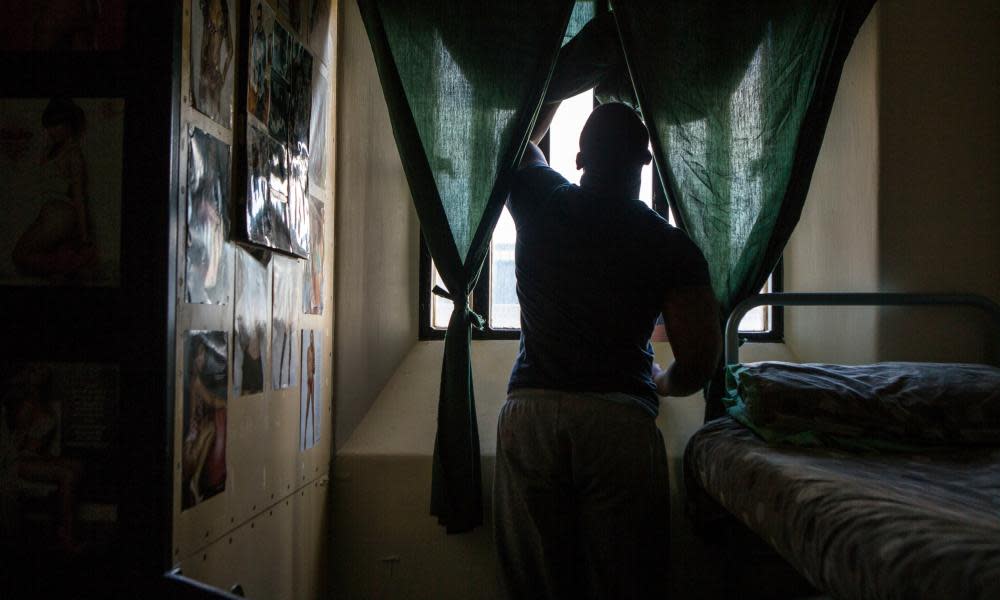Torture victims kept in solitary by Home Office for up to a year

The Home Office has pursued a policy of psychological brutality by locking up scores of torture survivors in solitary confinement for indefinite periods, according to fresh testimony from immigration detainees.
Interviews dictated from prison reveal some torture and trafficking victims have had to spend more than 23 hours a day in solitary confinement for periods of up to a year. Their accounts portray mental health breakdown, self-harm and suicide attempts after the Home Office opted to place detainees inside the prison network as part of its Covid measures.
The charity Bail for Immigration Detainees (Bid) has written to senior immigration officials warning the prolonged solitary confinement of an estimated 500 detainees appeared to breach the UN’s minimum standards for the treatment of prisoners.
Araniya Kogulathas, Bid’s legal manager, said: “Even short periods in solitary confinement are associated with psychological consequences, including anger, depression, anxiety, paranoia, psychosis and exacerbation of underlying mental illness.”
Separate new data shows the Home Office’s detention gatekeeper function, a safeguarding system designed to prevent victims of trafficking, torture or modern slavery from being detained in immigration removal centres, prevented just 3% of its referrals from being locked up.
Of 13,358 asylum seekers categorised as vulnerable and who were referred to the safeguarding system during the first nine months of last year, just 398 were spared detention – a record low since the scheme was introduced five years ago. In the previous year, 1,068 out of 21,497, or 5%, avoided being detained.
Sile Reynolds, senior policy adviser at the charity Freedom From Torture, said: “We have serious concerns that a system designed to protect vulnerable individuals is, in reality, allowing many to fall through the gaps.”
One detainee, a European national arrested for an offence but never charged, describes being held in solitary confinement for three months from January for more than 23 hours a day. A torture survivor, he self-harmed and tried to hang himself.
His witness statement, dated 10 May, says that despite the Home Office possessing three separate medical reports on his unsuitability for detention – including being a torture victim and suicide risk – it still contested his release from prison. “I was hearing voices and self-harmed, which led to heavy bleeding. I could see no way out,” stated the detainee. A cellmate requested to be moved because they “didn’t want to watch me die”.
A male held in solitary confinement for seven months from last September says his Home Office case worker wanted him to stay in prison “indefinitely”. This was despite his medical records outlining a long history of self-harm and that he “experienced torture in his home country”, including being stabbed in his head and leg.
He became so “desperate” that he contemplated asking the Home Office to deport him home, despite a high risk of being persecuted on his return.
Another detainee, in his 20s, said: “I feel that foreign nationals are treated like they don’t matter and that the Home Office wants us to be forgotten. I don’t have a good understanding of the law, but I find it hard to believe that solitary confinement for so long could be legal.”
The testimonies raise questions over the government’s continued hostile environment approach and follow a change in rules that means that from the end of May more victims of trafficking are likely to be detained and forcibly removed from the UK.
Referring to the data, released under freedom of information laws, Reynolds said: “This government is failing people who are in urgent need of protection and rehabilitation.”
The Home Office said: “Covid-19 has severely disrupted international travel meaning fewer individuals have been detained and there are therefore fewer cases which require the attention of the detention gatekeeper.”

 Yahoo Movies
Yahoo Movies 
